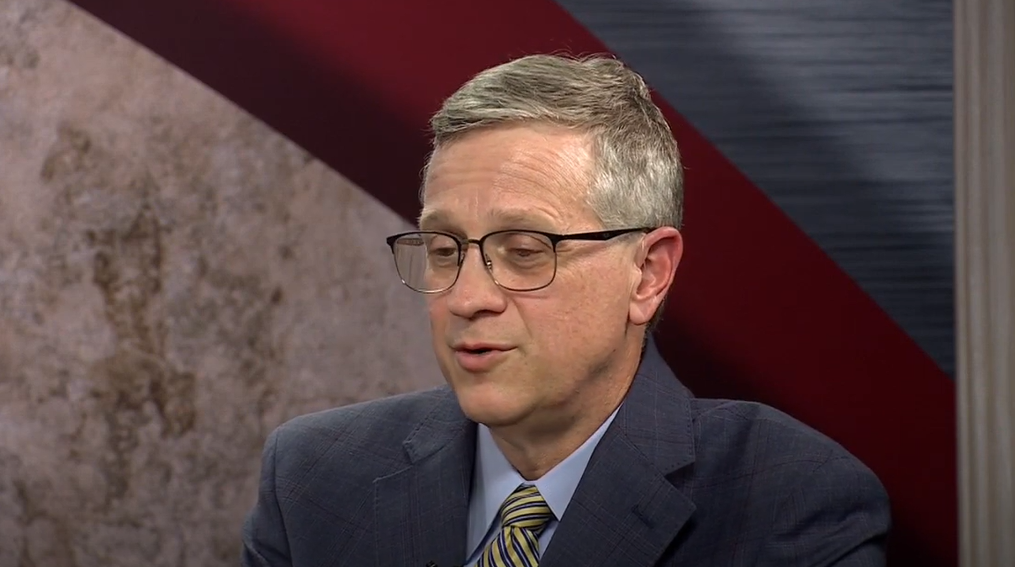Pharmaceutical giant Pfizer released on Monday some preliminary findings that its COVID-19 vaccine candidate appears to be 90% effective, a development that UAB vaccine expert Dr. Paul Goepfert, M.D., called “tremendous news.”
“The most optimistic of us were thinking about 70% effective, so 90% effectiveness is fantastic,” remarked Goepfert on a press briefing held via videoconference on Monday afternoon.
Goepfert’s remarks were a reference to the long-held belief among many researchers that a COVID-19 vaccine developed so quickly might only be able to prevent infection among 60%-70% of people who took it, a benchmark the initial Pfizer results seem to have far exceeded.
Goepfert is a professor of medicine at UAB and has served as the director of the Alabama Vaccine Research Clinic since 2004. He is a highly cited vaccine researcher in scientific journals, a key indicator of respect and accomplishment in the scientific community.
Pfizer’s vaccine is given in two doses, via injection, taken three weeks apart, and it was developed in partnership with the company BioNTech.
As part of Operation Warp Speed, the Trump administration agreed to buy 100 million doses of the Pfizer vaccine in July at the cost of $1.95 billion, allowing the company to finance its large scale development and manufacturing capacity.
Unlike other leading vaccine candidates, Pfizer did not use Warp Speed money to finance the development or early-stage trials for their vaccine candidate, leading to some now cleared up confusion on Monday about whether it was part of Operation Warp Speed at all.
Pfizer has said it will apply to the FDA for the vaccine to be used by the public once half the patients in the current vaccine trial phase have gone two months since their second dose with no issues.
The company expects to pass that mark in late November, which could pave the way for doses to be sent to the public before the end of the year; a result many health experts, including Alabama State Health Officer Dr. Scott Harris, have been expecting.
Pfizer’s CEO confirmed Monday that it would be free for every American if approved for use.
Another drugmaker, Moderna, began its trials only shortly after Pfizer. Both companies are using a very similar chemical structure to make their vaccines. Medical news site STAT reported Monday that Pfizer’s results “likely have sparked celebrations” in Moderna’s offices due to the similarities of the products.
Goepfert advised Monday that, if the Pfizer vaccine is indeed 90% effective, around 60% of the population would need to take the vaccine to achieve herd immunity.
He explained that the percentage of the population that must get the vaccine drops for every increase in the vaccine’s effectiveness, and vice versa.
While discussing Pfizer’s 90% reported effectiveness rate, Goepfert offered for the sake of comparison that in the best of years, a flu vaccine is about 60% effective, and some years flu vaccines are 30% or less effective.
He also noted that “COVID strains by and large are not like flu; in fact, COVID-19 is not going to change like flu changes. … This is much, much better than a flu vaccine.”
Though largely positive, Goepfert also brought up several reasons to be cautious with the optimism around the newly announced Pfizer results.
For one, he warned that Pfizer’s vaccine must be stored at -8 degrees celsius (around 18 degrees Fahrenheit) between when it is manufactured and injected. He mentioned this could cause problems with distribution because relatively few locations are equipped with large scale storage capable of maintaining that temperature.
Goepfert also pointed out that the Pfizer vaccine reportedly causing local reactions is not ideal. He pointed those interested to a paper published in the scientific journal Nature that showed large majorities of those in the early trials of the vaccine reported pain at the injection site. The paper reports that “all local reactions were mild or moderate in severity except for one report of severe pain.”
Goepfert also pointed out that the information made available by Pfizer is still relatively limited and said it should prompt caution that he and the other scientists and journalists discussing the topic are currently working off a press release from Pfizer. Goepfert believes that it is possible some complicating pieces of evidence may become public in the future that could diminish the current excitement around the Pfizer vaccine. He said multiple times on Monday that he wants to see more data.
“I think it is going to be accurate, but it is a limited data set,” he said in summation about the Pfizer release.
The vaccine expert also mentioned that the Pfizer vaccine is only on track to be approved for use among adults, and adults are typically less prone to getting vaccines than children. Goepfert believes a “herculean effort” will be necessary over the next year to achieve the needed number of vaccinated adults.
Goepfert continued to urge mask-wearing and social distancing, for the time being, saying that keeping infections down in the interim is helpful to the overall pandemic efforts.
“Now we have an endpoint. Now we see there is a vaccine that could work. You want to prevent as much death as you can, at which time you can get the vaccine,” he remarked about the upcoming months.
Henry Thornton is a staff writer for Yellowhammer News. You can contact him by email: henry@new-yhn.local or on Twitter @HenryThornton95












